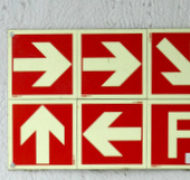Moving From Either/Or to Both/And
Blog / Produced by The High Calling
I was festering one day over a work situation which I had instinctively interpreted as a zero sum game. By that, I mean there were two players and only two potential outcomes: a winner and a loser.
This win-lose attitude was naturally accompanied by a generous barrage of negative thoughts, driven by a desperate need for survival and self-preservation. I had to grab my piece of the pie, because, as everyone knows, there is only so much to go around.
And this, ladies and gentlemen, is how life is played out in the hyper-competitive workspace. Whether it's building market share, or seeking approval from a boss, or deciding how to spend the afternoon, we tend to see things in terms of limited choices and mutually exclusive options.
This two-dimensional thinking bleeds over into our personal lives as well, and even into our politics and theology. We like to organize everything into nice, neat categories: democrat or republican; tree-hugger or capitalist; jock or nerd; predestination or free will.
Scientists tell us that putting things into hard categories makes life easier, because it gives us a frame of reference for interpreting the world. It’s like telling ourselves the same old stories, until it’s all we see. But sometimes I wonder if all this dichotomous thinking is also a sign of immaturity, or stagnation, or spiritual laziness.
Maybe the hard-wired thinking is not so much to blame as is our culturally entrenched Western thought, with its linear thinking and process orientation and sharp corners and lines around everything. We are all educated from early childhood to be analysts, moving from A to B to C.
I heard about this philosophical concept called Antinomy, which says that two contradictory and opposing ideas can both be one hundred percent true and valid at the same time. It’s like holding on to a paradox, which requires a light grip,and a penchant for being comfortable with not knowing all the answers. Apparently the ancient Eastern cultures like the Bhuddists and Hindus find it much easier to practice this type of thing, to hold a belief in two contradictory thoughts.
Ironically, God created our entire universe filled with paradox. Take quantum mechanics, for instance, and the strange little photon, which makes up the beams of light that stream down upon us in all its glory. It has properties of both a wave and a particle, which any good scientist will tell you is impossible, because they are mutually exclusive. But there it is anyway, dancing and sparkling and doing its thing. God sure is tricky.
Have I been snookered by everything I ever learned into an either/or view on life, when there was an opportunity for both/and?
Rather than getting hung up on polarities and extremes, author Margaret Wheatley suggests, “Humility and curiosity shift us to center. Just by being curious, we move toward the middle ground, with its fertile promise of new ideas and new relationships.”
This is the type of thinking Harvard Business Professor Michael Porter is proposing with his “Shared Value” theory, an approach where both business and society come out ahead, rather than one succeeding at the expense of the other.
So, what if there really is enough pie to go around, for everyone, all the time? I could kick myself, because so often I approach life with a limited, constrained point of view, which is really just a mentality of depletion and impoverishment. That's no way to live.
What would happen if I opened my mind and spirit to the possibilities of greater, more creative alternatives? Well, for one thing, I would probably not be on a frantic rampage to outmaneuver a colleague, or weasel my way towards a more favorable position at someone else's expense.
I would pray more. I would take deep breaths, and think higher thoughts. I would look for a better outcome for everyone.
I’d start telling myself a different story.
Image by Thomas Guignard. Used with permission. Sourced via Flickr.








